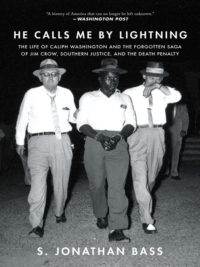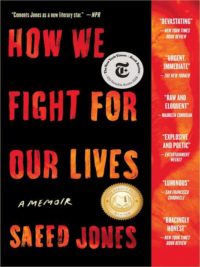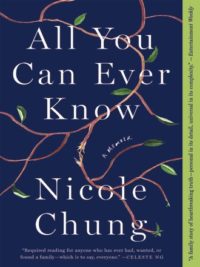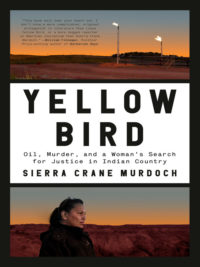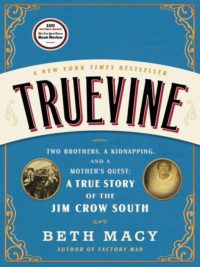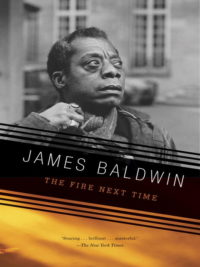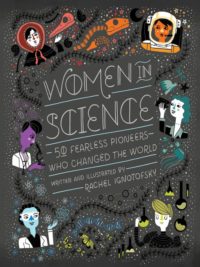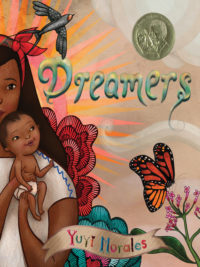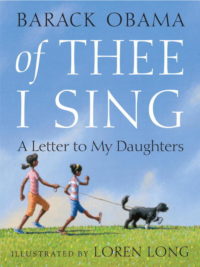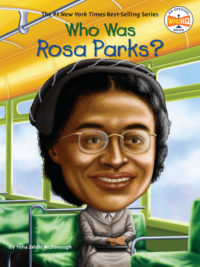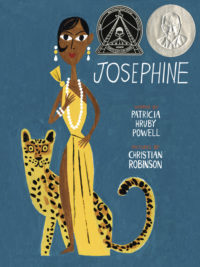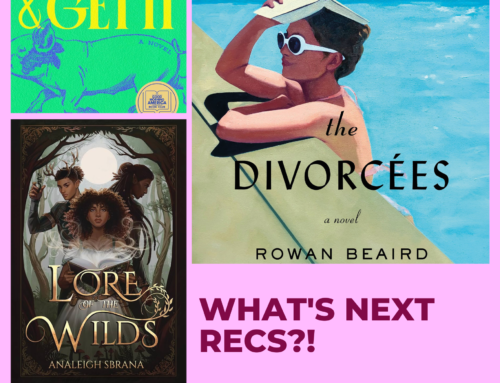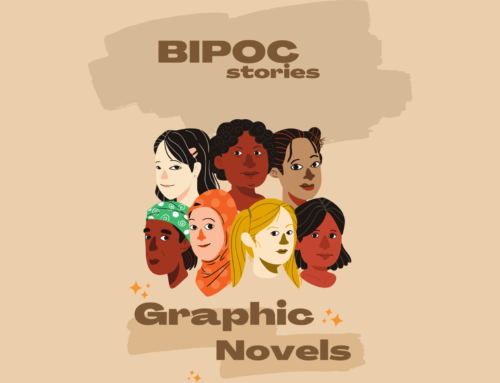Why should you read books written and featuring minorities and women? Reading about the stories of diverse Americans is a great way to understand and appreciate one another. Representation is important at all levels of literature (check out this article by Scholastic Books’ On My Mind blog on why representation means to children). We all want to see and read about people we can relate to. Also, reading about people who are different from us allows for us to expand our understanding of the world around us, regardless if we can visit them physically or just virtually (check out this article where the author only read books by minority authors for a year and her experiences while doing so). By reading books written and featuring minorities and women, it also encourages publishing houses to publish more books written by and about these topics and market them the same as other books (check out this article by NPR about diversity in publishing).
So are you ready to start reading? Check out these eBooks available on Overdrive/Libby to begin!
He Calls Me By Lightning by S. Jonathan Bass
Named one of the Best Books of the Year by the Washington Post and Kirkus Reviews
A New York Times Book Review Editors’ Choice Selection
A Southern Independent Booksellers Association “Spring Pick”
This harrowing portrait of the Jim Crow South “proves how much we do not yet know about our history” (New York Times Book Review).
Caliph Washington didn’t pull the trigger but, as Officer James “Cowboy” Clark lay dying, he had no choice but to turn on his heel and run. The year was 1957; Cowboy Clark was white, Caliph Washington was black, and this was the Jim Crow South.
Widely lauded for its searing “insight into a history of America that can no longer be left unknown” (Washington Post), He Calls Me by Lightning is an “absorbing chronicle” (Ira Katznelson) of the forgotten life of Caliph Washington that becomes an historic portrait of racial injustice in the civil rights era. Washington, a black teenager from the vice-ridden city of Bessemer, Alabama, was wrongfully convicted of killing a white Alabama policeman in 1957 and sentenced to death. Through “meticulous research and vivid prose” (Patrick Phillips), S. Jonathan Bass reveals Washington’s Kafkaesque legal odyssey: he came within minutes of the electric chair nearly a dozen times and had his conviction overturned three times before finally being released in 1972. Devastating and essential, He Calls Me by Lightning demands that we take into account the thousands of lives cast away by the systemic racism of a “social order apparently unchanged even today” (David Levering Lewis).
Casi Una Mujer by Esmeralda Santiago
A simultaneous Spanish-language edition, originally translated for Vintage by
Nina Torres-Vidal
In her new memior, the acclaimed author of When I Was Puerto Rican continues the riveting chronicle of her life.
“Negi,” as Santiago’s family affectionately calls her, leaves rural Macun in 1961 to live in a three-bedroom tenement apartment with seven siblings, and inquisitive grandmother, and a strict mother who won’t allow her to date. At thirteen, Negi yearns for her own bed, for privacy, and her father, who remains in Puerto Rico. Translating for Mami at the welfare office in the morning, starring as Cleopatra at New York’s Performing Arts High School in the afternoon, and dancing salsa all night, she also seeks to find balance between being an American and Puerto Rican. When Negi defies her mother by going on a series of dates, she finds that independence brings challenges.
At once a universally poignant coming-of-age tale and a heartfelt immigrant’s story, Almost a Woman is Santiago’s triumphant journey into womanhood.
This Heart Holds Many by Koe Creation
How We Fight For Our Lives by Saeed Jones
“People don’t just happen,” writes Saeed Jones. “We sacrifice former versions of ourselves. We sacrifice the people who dared to raise us. The ‘I’ it seems doesn’t exist until we are able to say, ‘I am no longer yours.'”Haunted and haunting, How We Fight for Our Lives is a stunning coming-of-age memoir about a young, black, gay man from the South as he fights to carve out a place for himself, within his family, within his country, within his own hopes, desires, and fears. Through a series of vignettes that chart a course across the American landscape, Jones draws readers into his boyhood and adolescence—into tumultuous relationships with his family, into passing flings with lovers, friends, and strangers. Each piece builds into a larger examination of race and queerness, power and vulnerability, love and grief: a portrait of what we all do for one another—and to one another—as we fight to become ourselves.An award-winning poet, Jones has developed a style that’s as beautiful as it is powerful—a voice that’s by turns a river, a blues, and a nightscape set ablaze. How We Fight for Our Lives is a one-of-a-kind memoir and a book that cements Saeed Jones as an essential writer for our time.
Incidents in the Life of a Slave Girl by Linda Brent
Incidents in the Life of a Slave Girl is the immensely powerful autobiography of Harriet Jacobs, who wrote under a pen name. A feminist work, she uses her experiences to state and restate her belief that though all unhappiness sprung from being a slave, she had to endure worse, being also a woman. Her experiences show that the only refuge and relief to be found were in other women, and also that women were less able to attempt freedom when that would mean leaving their children behind. Her autobiography is the account of her struggle to achieve that freedom and respect and redefine herself. Her life is a testament to her grandmother’s credo: “He that is willing to be a slave, let him be a slave.”
Hidden Figures by Margot Shetterly
New York Times Bestseller
The phenomenal true story of the black female mathematicians at NASA whose calculations helped fuel some of America’s greatest achievements in space. Soon to be a major motion picture starring Taraji P. Henson, Octavia Spencer, Janelle Monae, Kirsten Dunst, and Kevin Costner.
Before John Glenn orbited the earth, or Neil Armstrong walked on the moon, a group of dedicated female mathematicians known as “human computers” used pencils, slide rules and adding machines to calculate the numbers that would launch rockets, and astronauts, into space.
Among these problem-solvers were a group of exceptionally talented African American women, some of the brightest minds of their generation. Originally relegated to teaching math in the South’s segregated public schools, they were called into service during the labor shortages of World War II, when America’s aeronautics industry was in dire need of anyone who had the right stuff. Suddenly, these overlooked math whizzes had a shot at jobs worthy of their skills, and they answered Uncle Sam’s call, moving to Hampton, Virginia and the fascinating, high-energy world of the Langley Memorial Aeronautical Laboratory.
All You Can Ever Know by Nicole Chung
NATIONAL BESTSELLER
What does it mean to lose your roots—within your culture, within your family—and what happens when you find them?
Nicole Chung was born severely premature, placed for adoption by her Korean parents, and raised by a white family in a sheltered Oregon town. From childhood, she heard the story of her adoption as a comforting, prepackaged myth. She believed that her biological parents had made the ultimate sacrifice in the hope of giving her a better life, that forever feeling slightly out of place was her fate as a transracial adoptee. But as Nicole grew up—facing prejudice her adoptive family couldn’t see, finding her identity as an Asian American and as a writer, becoming ever more curious about where she came from—she wondered if the story she’d been told was the whole truth.
With warmth, candor, and startling insight, Nicole Chung tells of her search for the people who gave her up, which coincided with the birth of her own child. All You Can Ever Know is a profound, moving chronicle of surprising connections and the repercussions of unearthing painful family secrets—vital reading for anyone who has ever struggled to figure out where they belong.
Yellow Bird by Sierra Crane Murdoch
The gripping true story of a murder on an Indian reservation, and the unforgettable Arikara woman who becomes obsessed with solving it—an urgent work of literary journalism.
“I don’t know a more complicated, original protagonist in literature than Lissa Yellow Bird, or a more dogged reporter in American journalism than Sierra Crane Murdoch.”—William Finnegan, Pulitzer Prize–winning author of Barbarian Days
NAMED ONE OF THE BEST BOOKS OF THE YEAR BY PUBLISHERS WEEKLY
When Lissa Yellow Bird was released from prison in 2009, she found her home, the Fort Berthold Indian Reservation in North Dakota, transformed by the Bakken oil boom. In her absence, the landscape had been altered beyond recognition, her tribal government swayed by corporate interests, and her community burdened by a surge in violence and addiction. Three years later, when Lissa learned that a young white oil worker, Kristopher “KC” Clarke, had disappeared from his reservation worksite, she became particularly concerned. No one knew where Clarke had gone, and few people were actively looking for him.
Yellow Bird traces Lissa’s steps as she obsessively hunts for clues to Clarke’s disappearance. She navigates two worlds—that of her own tribe, changed by its newfound wealth, and that of the non-Native oilmen, down on their luck, who have come to find work on the heels of the economic recession. Her pursuit of Clarke is also a pursuit of redemption, as Lissa atones for her own crimes and reckons with generations of trauma. Yellow Bird is an exquisitely written, masterfully reported story about a search for justice and a remarkable portrait of a complex woman who is smart, funny, eloquent, compassionate, and—when it serves her cause—manipulative. Drawing on eight years of immersive investigation, Sierra Crane Murdoch has produced a profound examination of the legacy of systematic violence inflicted on a tribal nation and a tale of extraordinary healing.
Truevine by Beth Macy
The true story of two African-American brothers who were kidnapped and displayed as circus freaks, and whose mother endured a 28-year struggle to get them back.
The year was 1899 and the place a sweltering tobacco farm in the Jim Crow South town of Truevine, Virginia. George and Willie Muse were two little boys born to a sharecropper family. One day a white man offered them a piece of candy, setting off events that would take them around the world and change their lives forever.
Captured into the circus, the Muse brothers performed for royalty at Buckingham Palace and headlined over a dozen sold-out shows at New York’s Madison Square Garden. They were global superstars in a pre-broadcast era. But the very root of their success was in the color of their skin and in the outrageous caricatures they were forced to assume: supposed cannibals, sheep-headed freaks, even “Ambassadors from Mars.” Back home, their mother never accepted that they were “gone” and spent 28 years trying to get them back.
Through hundreds of interviews and decades of research, Beth Macy expertly explores a central and difficult question: Where were the brothers better off? On the world stage as stars or in poverty at home? Truevine is a compelling narrative rich in historical detail and rife with implications to race relations today.
Raising My Rainbow by Lori Duron
Raising My Rainbow is Lori Duron’s frank, heartfelt, and brutally funny account of her and her family’s adventures of distress and happiness raising a gender-creative son.
Whereas her older son, Chase, is a Lego-loving, sports-playing boy’s boy, Lori’s younger son, C.J., would much rather twirl around in a pink sparkly tutu, with a Disney Princess in each hand while singing Lady Gaga’s “Paparazzi.”
C.J. is gender variant or gender nonconforming, whichever you prefer. Whatever the term, Lori has a boy who likes girl stuff—really likes girl stuff. He floats on the gender-variation spectrum from super-macho-masculine on the left all the way to super-girly-feminine on the right. He’s not all pink and not all blue. He’s a muddled mess or a rainbow creation. Lori and her family choose to see the rainbow.
Written in Lori’s uniquely witty and warm voice and launched by her incredibly popular blog of the same name, Raising My Rainbow is the unforgettable story of her wonderful family as they navigate the often challenging but never dull privilege of raising a slightly effeminate, possibly gay, totally fabulous son.
The Line Becomes a River by Francisco Cantu
NAMED A TOP 10 BOOK OF 2018 BY NPR and THE WASHINGTON POST SHORTLISTED FOR THE ANDREW CARNEGIE MEDAL OF EXCELLENCE FINALIST FOR THE NATIONAL BOOK CRITIC CIRCLE’S JOHN LEONARD PRIZE. The instant New York Times bestseller, “A must-read for anyone who thinks ‘build a wall’ is the answer to anything.” —Esquire
For Francisco Cantú, the border is in the blood: his mother, a park ranger and daughter of a Mexican immigrant, raised him in the scrublands of the Southwest. Driven to understand the hard realities of the landscape he loves, Cantú joins the Border Patrol. He and his partners learn to track other humans under blistering sun and through frigid nights. They haul in the dead and deliver to detention those they find alive. Plagued by a growing awareness of his complicity in a dehumanizing enterprise, he abandons the Patrol for civilian life. But when an immigrant friend travels to Mexico to visit his dying mother and does not return, Cantú discovers that the border has migrated with him, and now he must know the full extent of the violence it wreaks, on both sides of the line.
In the Dream House by Carmen Maria Machado
In the Dream House is Carmen Maria Machado’s engrossing and wildly innovative account of a relationship gone bad, and a bold dissection of the mechanisms and cultural representations of psychological abuse. Tracing the full arc of a harrowing relationship with a charismatic but volatile woman, Machado struggles to make sense of how what happened to her shaped the person she was becoming.And it’s that struggle that gives the book its original structure: each chapter is driven by its own narrative trope—the haunted house, erotica, the bildungsroman—through which Machado holds the events up to the light and examines them from different angles. She looks back at her religious adolescence, unpacks the stereotype of lesbian relationships as safe and utopian, and widens the view with essayistic explorations of the history and reality of abuse in queer relationships.Machado’s dire narrative is leavened with her characteristic wit, playfulness, and openness to inquiry. She casts a critical eye over legal proceedings, fairy tales, Star Trek, and Disney villains, as well as iconic works of film and fiction. The result is a wrenching, riveting book that explodes our ideas about what a memoir can do and be.
The Fire Next Time by James Baldwin
A national bestseller when it first appeared in 1963, The Fire Next Time galvanized the nation, gave passionate voice to the emerging civil rights movement—and still lights the way to understanding race in America today.”Basically the finest essay I’ve ever read. . . . Baldwin refused to hold anyone’s hand. He was both direct and beautiful all at once. He did not seem to write to convince you. He wrote beyond you.” —Ta-Nehisi Coates
At once a powerful evocation of James Baldwin’s early life in Harlem and a disturbing examination of the consequences of racial injustice, the book is an intensely personal and provocative document from the iconic author of If Beale Street Could Talk and Go Tell It on the Mountain. It consists of two “letters,” written on the occasion of the centennial of the Emancipation Proclamation, that exhort Americans, both black and white, to attack the terrible legacy of racism. Described by The New York Times Book Review as “sermon, ultimatum, confession, deposition, testament, and chronicle…all presented in searing, brilliant prose,” The Fire Next Time stands as a classic of literature.
And here are a few additional titles that are children’s level books:
50 Fearless Pioneers Who Changed the World by Rachel Ignotofsky
— BrainPickings – Best Science Books of the Year
Dreamers by Yuyi Morales
— BrainPickings – Best Science Books of the Year
Of Thee I Sing by Barack Obama
In this tender, beautiful letter to his daughters, President Barack Obama has written a moving tribute to thirteen groundbreaking Americans and the ideals that have shaped our nation. From the artistry of Georgia O’Keeffe, to the courage of Jackie Robinson, to the patriotism of George Washington, President Obama sees the traits of these heroes within his own children, and within all of America’s children.Breathtaking, evocative illustrations by award-winning artist Loren Long at once capture the personalities and achievements of these great Americans and the innocence and promise of childhood.This beautiful book celebrates the characteristics that unite all Americans, from our nation’s founders to generations to come. It is about the potential within each of us to pursue our dreams and forge our own paths. It is a treasure to cherish with your family forever.
Who Was Rosa Parks by Yona Zeldis McDonough
Josephine by Patricia Hruby Powell
Robert F. Sibert Informational Book Award, Honor
Boston Globe–Horn Book Award, Nonfiction Honor
In exuberant verse and stirring pictures, Patricia Hruby Powell and Christian Robinson create an extraordinary portrait for young people of the passionate performer and civil rights advocate Josephine Baker, the woman who worked her way from the slums of St. Louis to the grandest stages in the world. Meticulously researched by both author and artist, Josephine’s powerful story of struggle and triumph is an inspiration and a spectacle, just like the legend herself.

